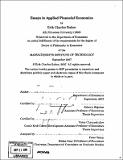Essays in applied financial economics
Author(s)
Ruben, Erik Charles
DownloadFull printable version (12.29Mb)
Other Contributors
Massachusetts Institute of Technology. Dept. of Economics.
Advisor
Roberto Rigobon and Victor Chernozhukov.
Terms of use
Metadata
Show full item recordAbstract
This dissertation is composed of three chapters. The first demonstrates that natural gas violates many of the simplifying assumptions frequently used in modeling its behavior. Careful analysis of futures contracts written on gas suggests that gas prices are seasonal while returns are non-Gaussian and evidence stochastic volatility. In addition, examination of options prices indicates the intermittent presence of jumps. We find that models which disregard these properties struggle to recover options prices with any precision. Thus, we propose an alternative nonparametric approach to gas options pricing that captures these salient features while also shedding light on the nature of risk aversion embedded in gas markets. The second chapter offers a parametric approach to pricing derivatives written on natural gas futures designed to overcome the shortcomings of existing parametric schemes. First, it proposes a model of the underlying futures prices that admits stochastic volatility. Second, it makes use of a state-of-the-art Bayesian particle filtering technique to estimate the underlying process parameters along with a simulation-based technique for option pricing. While it trades off some performance relative to nonparametric approaches, such as the kernel scheme employed in the first chapter, the strategy employed is very general and allows for the pricing of more complex derivatives. The final chapter presents new estimates and approaches to estimating the home bias puzzle. It uses micro-level data to calculate households' foreign equity exposure as a function of wealth. We find simple estimates have significant errors-in-variables problems and we construct an estimator using grouping to account for this issue. Our estimates still imply low aggregate investment in foreign equity. (cont) Finally, we disaggregate the investment decision by incorporating two step decisions that allow households to forgo participating in the market. As a result of the decoupling, we find foreign equity levels closer to that of standard portfolio theories.
Description
Thesis (Ph. D.)--Massachusetts Institute of Technology, Dept. of Economics, 2007. Includes bibliographical references.
Date issued
2007Department
Massachusetts Institute of Technology. Department of EconomicsPublisher
Massachusetts Institute of Technology
Keywords
Economics.